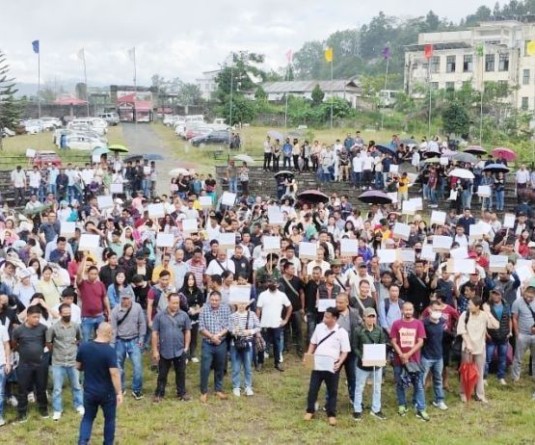
Kohima, March 4 (MExN): The Fourteenth Finance Commission, constituted in pursuance of the provisions of the Constitution of India under the chairmanship of Dr. Y.V. Reddy, has invited suggestions on issues related to the terms of reference from members of the general public, institutions and organizations.
The Commission will eventually make recommendations covering a period of five years commencing April 1, 2015.
Pertinent for Nagaland would be suggestions on principles which should govern the grants-in-aid of the revenue of the States out of the Consolidated Fund of India and the sums to be paid to the States which are in need of assistance by way of grants-in-aid of their revenues.
Suggestions will also be considered for measures needed to augment the Consolidated Fund of a State to supplement the resources of the Panchayats and Municipalities in the State on the basis of the recommendations made by the Finance Commission of the State.
The Commission shall review the state of the finances, deficit and debt levels of the Union and the States, keeping in view, in particular, the fiscal consolidation roadmap recommended by the Thirteenth Finance Commission. Measures should be suggested for maintaining a stable and sustainable fiscal environment consistent with equitable growth including suggestions to amend the Fiscal Responsibility Budget Management Acts (FRBMA) currently in force.
In its recommendations, the Commission will keep in mind the objective of not only balancing the receipts and expenditure on revenue account of all the States and the Union, but also generating surpluses for capital investment.
In making recommendations, the Commission will regard, among others, resources of the Central Government for five years commencing on April 1, 2015, on the basis of levels of taxation and non-tax revenues likely to be reached during 2014-2015. It will consider demands on the resources of the Central Government, in particular, on account of the expenditure on civil administration, defence, internal and border security, debt-servicing and other committed expenditure and liabilities.
In debt stressed states, the Commission will consider resources of the State Governments and the demands on such resources under different heads, including the impact of debt levels on resource availability, for the mentioned five years, on the basis of levels of taxation and non-tax revenues likely to be reached during 2014-15.
Taxation efforts of the Central Government and each State Government and the potential for additional resource mobilisation to improve the tax- GDP ratio in the case of Union and tax-GSDP ratio in the case of the States will be considered.
The Commission will also judge the level of subsidies that are required, with regard to the need for sustainable and inclusive growth, and equitable sharing of subsidies between the Central Government and State Governments, apart from expenditure on the non-salary component of maintenance and upkeep of capital assets and the non-wage related maintenance expenditure on plan schemes to be completed by March 31, 2015 and the norms on the basis of which specific amounts are recommended for the maintenance of the capital assets and the manner of monitoring such expenditure.
Some of the other things to be considered are: the need for insulating the pricing of public utility services like drinking water, irrigation, power and public transport from policy fluctuations through statutory provisions; the need for making public sector enterprises competitive and market oriented; listing and disinvestment; and relinquishing of non-priority enterprises; the need to balance management of ecology, environment and climate change consistent with sustainable economic development; and the impact of the proposed Goods and Services Tax on the finances of Centre and States and the mechanism for compensation in case of any revenue loss.
In making its recommendations on various matters, the Commission proposes to take the base of population figures as of 1971 in all cases where population is a factor for determination of devolution of taxes and duties and grants-in-aid; however, the Commission may also take into account the demographic changes that have taken place subsequent to 1971.
The Commission may review the present Public Expenditure Management system in place including the budgeting and accounting standards and practices; the existing system of classification of receipts and expenditure; linking outlays to outputs and outcomes: best practices within the country and internationally.
The Commission may review the present arrangements as regards financing of Disaster Management with reference to the funds constituted under the Disaster Management Act, 2005 (53 of 2005). The Commission shall indicate the basis on which it has arrived at its findings and make available the State-wise estimates of receipts and expenditure.
The Notice as well as relevant material on the previous Finance Commission is available on http://fincomindia.nic.in.
The Finance Commission encourages encourage suggestions/views from interested organisations and individuals to be sent by April 30, 2013 in any of the following manner:
(i) By post, addressed to the Secretary, Fourteenth Finance Commission, 19th Floor, Jawahar Vyapar Bhawan, Tolstoy Marg, New Delhi-110001.
(ii) Through e-mail to: secy-ffc@nic.in.
(iii) Through website http://fincomindia.nic.in by clicking on hyperlink ‘call for suggestions’





